De Engelse dichteres en schrijfster Anne Brontë werd geboren op 17 januari 1820 in Thornton. Zie ook alle tags voor Anne Brontë op dit blog.
Verses To A Child
6
Now, Flora, thou hast but begun
To sail on life’s deceitful sea,
O do not err as I have done,
For I have trusted foolishly;
The faith of every friend I loved
I never doubted till I proved
Their heart’s inconstancy.
7
‘Tis mournful to look back upon
Those long departed joys and cares,
But I will weep since thou alone
Art witness to my streaming tears.
This lingering love will not depart,
I cannot banish from my heart
The friend of childish years.
8
But though thy father loves me not,
Yet I shall still be loved by thee,
And though I am by him forgot,
Say wilt thou not remember me!
I will not cause thy heart to ache;
For thy regretted father’s sake
I’ll love and cherish thee.
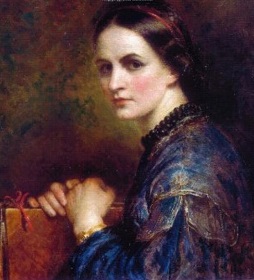
Anne Brontë (17 januari 1820 – 28 mei 1849)
De Vlaamse dichter en schrijver Jan Van Droogenbroeck werd geboren te Sint-Amands op 17 januari 1835. Zie ook alle tags voor Jan van Droogenbroeck op dit blog.
Mijn hond
Mijn hond is een plezante gast;
Hij springt, hij danst, hij jankt, hij bast,
Hij kwispelstaart, hij loopt in ’t rond,
Hij kruipt en rolt zich op den grond.
Zeg ik hem: ‘Hier!’ hij komt bij mij;
‘Voort!’ zeg ik, en op een, twee, drij
Is hij de deur uit, op den stoep,
En wacht tot ik hem binnenroep.
Zeg ik hem: ‘Koes!’ hij legt zich neer,
Zeg ik hem: ‘Wsst!’ hij recht zich weer.
‘Fiks!’ roep ik – en dan staat hij daar,
Juist als een aapje, flink en klaar.
Als ik naar school ga, komt hij mee
Tot in den gang en keert gedwee
Terug; maar als de klas is uit
Zit onze hond voor ’t vensterruit
Op schildwacht: ziet hij mij, dan: raf!
Hij wipt in eens het kussen af
En komt mij tegen op ‘nen draf,
Met blij geblaf.
Doch, als hij mij aan ’t schrijven ziet
Dan heeft het goede beest verdriet
Omdat hij mij niet helpen kan.
– Hij kent ja, niemendal ervan. –
Maar is de pen ter zij gelegd,
En heb ik hem eens ‘Mol!’ gezegd,
Dan moest gij zien wat gang hij gaat,
Hoe hij met zijnen pluimstaart slaat
En vlug vooroploopt naar de straat!
De vriendschap van het lieve dier
Verschaft mij waarlijk veel plezier.
– Daarom bemin ik mijnen hond;
Ik houd hem zuiver en gezond,
Ik maak hem een fatsoenlijk nest
En zorg voor eten in zijn’ test.
– Soms krijgt hij een stuk boterham,
Dan zegt dit lief kapoentje…. ham!
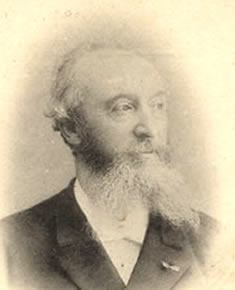
Jan Van Droogenbroeck (17 januari 1835 – 27 mei 1902)
De Surinaamse schrijfster en beeldend kunstenares Dorothee Wong Loi Sing werd geboren in Paramaribo op 17 januari 1954. Zie ook alle tags voor Dorothee Wong Loi Sing op dit blog.
Uit: Witmans hel
“Op UrAarde, waarvan alle parallelwerelden afstammen, lijden vele zwarten in de droge Afrikaanse woestijngebieden vrijwillig honger of sterven uitgemergeld de hongerdood, teneinde schuldgevoelens en hulpvaardigheid wakker te schudden in volgevreten Westerse profiteurs-maatschappijen. Terwijl sommige witmensen genieten van een enorme verspilling aan materiële goederen, worden de talloze armen en behoeftigen zoet gehouden met tweedehands stripverhalen die stukgelezen zijn, of een bioscoopje, waarin te zien is hoe in bepaalde Westerse landen auto’s voor de lol in de prak worden gereden, of met gigantische hoeveelheden voedsel wordt gesmeten. Vertoon zo’n film maar in Ethipoë, of in Sangra Besh!
Twee boosdoeners, die mijn bijzondere aandacht hebben, kregen van mij een bijzonder soort straf te verduren.
1e, Cecil Rhodes! De man die aan Zimbabwe zijn koloniale naam plakte van Rhodesië. Cecil Rhodes is nu een onderbetaalde uitgebuite zwarte mijnwerker in de Zuidafrikaanse goudmijnen. Zijn zweet wordt getransformeerd tot brokken goud, maar hij moet met lede ogen toezien dat hij er niet van kan profiteren. Hij heeft uiteraard een zwarte echtgenote en zes kinderen die er sjofel bijlopen, met hongerogen. Zijn vrouw werkt in een fabriek te Johansburg aan de lopende band, en de kinderen worden aan hun lot overgelaten door de gemene Ouma van de kinderen. Hijzelf is zich volledig bewust van zijn vorige leven en vergane machtspositie. Bij tijden wordt hij krankzinnig van spijt en ellende, maar hij moet dat geheim houden, anders kan hij geen weekloon verdienen.”
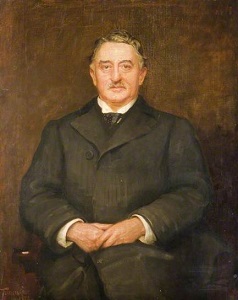
Dorothee Wong Loi Sing (Paramaribo, 17 januari 1954)
Portret van Cecil Rhodes door Philip Tennyson Cole, 1902
De Duitse schrijfster Hella Eckert werd geboren op 17 januari 1948 in Bremen. Zie ook alle tags voor Hella Eckert op dit blog.
Uit: Hanomag
„Es geschah in jenem blauen und verrückten Sommer, als ich sechzehn wurde. Mein Vater kam ins Gefängnis, und meine Mutter lernte einen Mann namens Karl Zerkowitz kennen und verliebte sich in ihn. Das geschah in einer Stadt am Meer, und es war die Zeit, als man von Containern sprach, 1966, als das Transportgeschäft boomte, und mein Vater hatte uns in diesem Jahr dorthin gebracht, weil er beim Bau eines Containerhafens dabei sein wollte. Er glaubte, dass man in der Stadt, wo Container verschifft würden, Geld verdiente oder es bald tun würde, und er wollte das, bevor jemandem einfiel, anstelle von Containern etwas anderes zu erfinden, sodass alle Mühe umsonst war.
Mein Vater fuhr einen Hanomag, einen Hanomag KURIER, er war Lastwagenfahrer von Beruf. Er hatte studiert, aber er war nicht weit herumgekommen, nicht in ferne Länder, und er war nicht im Krieg gewesen. Und seit 1950, dem Jahr, in dem ich geboren wurde, demselben Jahr, in dem er meine Mutter geheiratet hatte, war das seine Arbeit gewesen – das Fahren im Hanomag. Er hatte Maschinen, Kisten mit Werkzeug und Behälter transportiert in der Gegend, wo er aufgewachsen war, im Süden, in einem Dorf mit Maisfeldern an der Straße. Und in dieser Zeit, in der ich aufwuchs, waren wir an andere Orte gezogen. in die Nähe von Fabriken, und eine Zeitlang hatten wir dort gelebt, wo es die Universität gab, wo meine Mutter und er gewesen waren, wo sie sich kennengelernt und geheiratet hatten.
In den Behältern hatte mein Vater einen nassen Sommer lang Schnecken transportiert und sie an die umliegenden Restaurants verkauft, er hatte Geld damit verdient, und er hatte Leuten, die fortwollten aus dem Dorf beim Umziehen geholfen.“
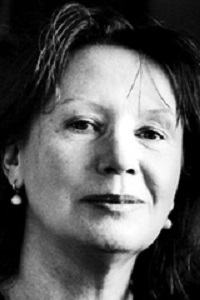
Hella Eckert (Bremen,17 januari 1948)
De Engelse schrijver Nevil Shute werd geboren op 17 januari 1899 in Ealing. Zie ook alle tags voor Nevil Shute op dit blog.
Uit: No Highway
‘You’re darn right,’ said Hennessey.
‘Well, now they come back with this,’ I said. I turned to them. ‘It just means we’ve got to do our best to find the thing. After all, it’s quite a big unit-over twenty feet long. It might be visible from the air.’ Hennessey said doubtfully, ‘lt’s a chance. It’s a pretty thickly wooded section of the country, though, and spruce and alder, they grow pretty fast this time of year. And all the leaves on,too.’
We talked about it for an hour. and then worked out the following programme. We would go up to the lake again in the Norseman, and trek up to the scene of the crash, prepared to camp there for four days. We would mark out an area halfa mile each way from the crash, one square mile in all, with the crashed Reindeer in the centre, and we would search that area minutely whatever the difficulties. If we did not discover the port tailplane there would be a strong presumption that the unit had come off in the air; it was too big a thing for the Russians to have removed in tow. That in itself would lend some substance to the theory of failure in fatigue.
After that area had been searched, we would then return to the lake and begin an air search of the district, flying the Norseman low above the tree-tops endeavouring to see the fallen tailplane, flying on closely parallel strips as in an air survey. None of us had much confidence in this procedure, but it was the only thing we could do.
‘One thing,’ said Russell. ‘We‘d better set to work and draft a cable to your chief telling him not to expect too much.’ We set to work to do so.”
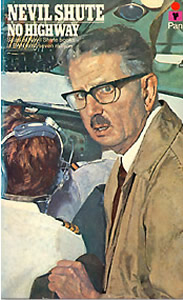
Nevil Shute (17 januari 1899 – 12 januari 1960)
Cover
De Engelse schrijfster Mrs Henry Wood werd geboren in Worcester op 17 januari 1814 als Ellen Price. Zie ook alle tags voor Mrs Henry Wood op dit blog.
Uit: It May Be True
“The village of Ashleigh is situated in one of the most lovely and romantic of the English counties; where mountains, valleys, woods and forest trees appear to vie with each other in stately magnificence. The village is literally embosomed amongst the trees. Lofty elms, majestic oaks, and wide-spreading beech trees grow in and around it. On one side, as far as the eye can reach, are mountains covered with verdure, with all their varied and lovely tints of green. On the other side the view is partially obstructed by a mass of forest trees growing in clumps, or forming an arch overhead, through which nevertheless may be gained a peep of the distant sea, with its blue waves, and sometimes the white sails of a ship; or, on a clear day, even the small fishermen’s boats can be distinguished dotted here and there like small pearls.
Ashleigh has its country inn and ivy-mantled church, with the small house dignified as the Parsonage, close by. Other houses are sprinkled here and there down the green lanes, or along the road, shaded by its lofty elms, at the end of which, on a small eminence, stands the Manor or “Big House,” as the villagers call it.
It is a large, brick building, but with nothing grand or imposing about it; in fact, but for the lovely grounds and plantations on a small scale around, the clematis, jasmine and other beautiful creepers, too numerous to mention, trained up its walls, and hanging in luxuriant festoons about the porch, and the dark ivy which almost covers the roof, the whole of one side, and part of the front itself, it would be an ugly, unwieldy-looking edifice; as it was, everything appeared bright and gladsome.
Before you reach the village, a bridge crosses a small stream which flows from the hill-side, and after winding gracefully and silently through the midst, passes by the mill and being just seen like a long thin thread of silver in the distance, is lost in the rich meadows beyond.”
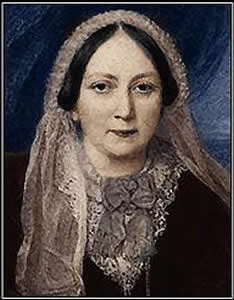
Mrs Henry Wood (17 januari 1814 – 10 februari 188
De Engelse schrijver, politicus en staatsman George Lyttelton, 1e Baron Lyttelton werd geboren in Hagley, Worcestershire op 17 januari 1709. Zie ook alle tags voor George Lyttelton op dit blog.
Uit: Dialogues of the Dead
“Louis_.–Who, sir, could have thought, when you were learning the trade of a shipwright in the dockyards of England and Holland, that you would ever acquire, as I had done, the surname of “Great.”
_Peter_.–Which of us best deserved that title posterity will decide. But my greatness appeared sufficiently in that very act which seemed to you a debasement.
_Louis_.–The dignity of a king does not stoop to such mean employments.
For my own part, I was careful never to appear to the eyes of my subjects or foreigners but in all the splendour and majesty of royal power.
_Peter_.–Had I remained on the throne of Russia, as my ancestors did, environed with all the pomp of barbarous greatness, I should have been idolised by my people–as much, at least, as you ever were by the French.
My despotism was more absolute, their servitude was more humble. But then I could not have reformed their evil customs; have taught them arts, civility, navigation, and war; have exalted them from brutes in human shapes into men. In this was seen the extraordinary force of my genius beyond any comparison with all other kings, that I thought it no degradation or diminution of my greatness to descend from my throne, and go and work in the dockyards of a foreign republic; to serve as a private sailor in my own fleets, and as a common soldier in my own army, till I had raised myself by my merit in all the several steps and degrees of promotion up to the highest command, and had thus induced my nobility to submit to a regular subordination in the sea and land service by a lesson hard to their pride, and which they would not have learnt from any other master or by any other method of instruction.“
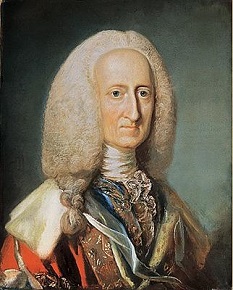
George Lyttelton (17 januari 1709 – 24 augustus 1773)
Portret door Edward Cunningham, 1770
